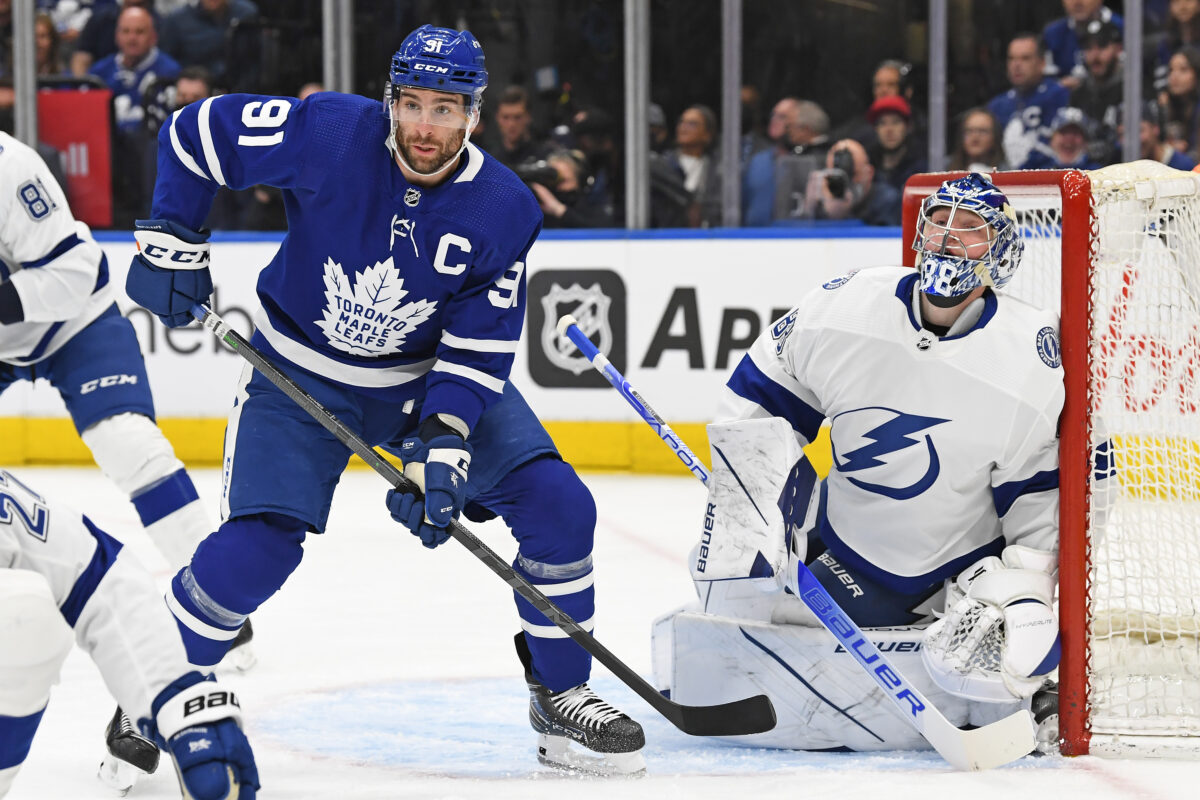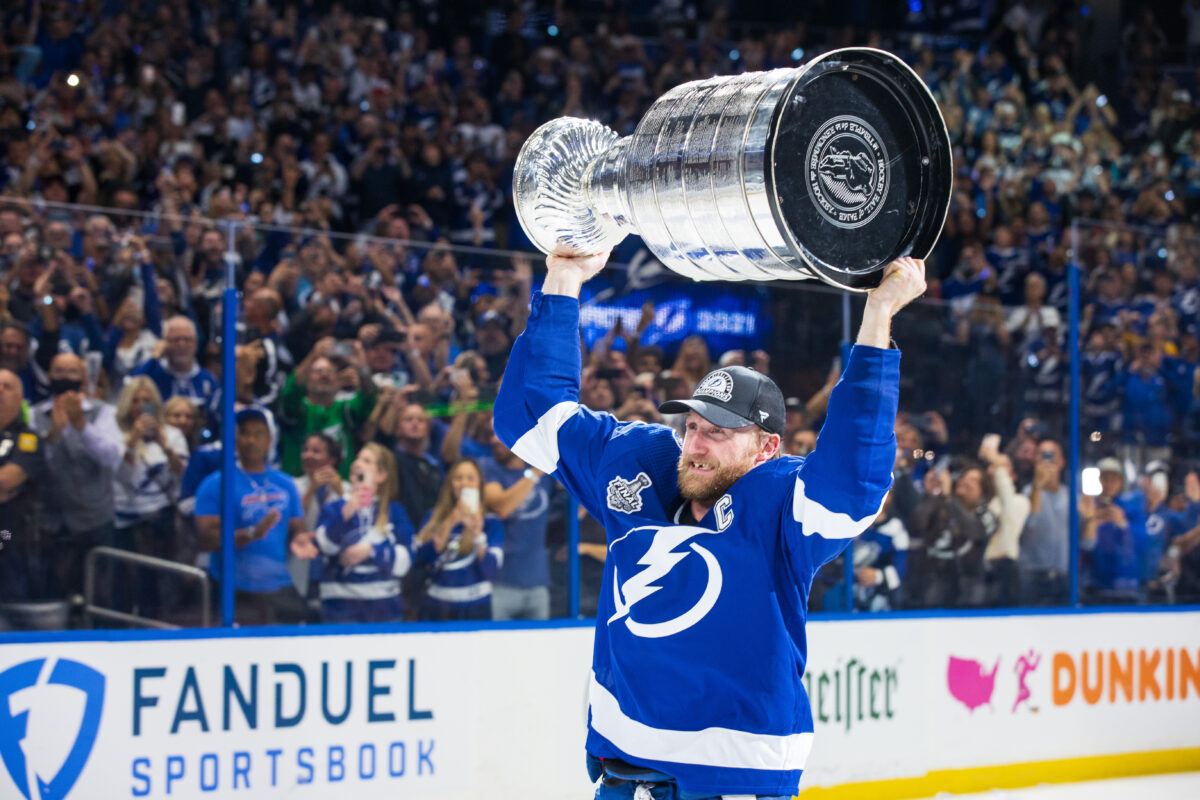In this edition of Toronto Maple Leafs, commentary, we’ll take a look at some of the things that are happening around the NHL that have an impact on the Maple Leafs. First, we’ll specifically look at the negotiations between the team and goalie Jack Campbell, and between the team and winger Ilya Mikheyev.

Second, we’ll look at an issue that popped to the surface with the controversial overtime goal, scored by ex-Maple Leafs’ center Nazem Kadri that gave the Colorado Avalance a 3-1 series lead over the Tampa Bay Lightning. Finally, we’ll look at each of the teams still playing to speculate if it was an advantage emerging from the Western Conference as opposed to coming out of the Eastern Conference.
Comment One: Campbell and Mikheyev’s Negotiations
Much has been made of the fact the Maple Leafs have not talked money with either the Ilya Mikheyev or the Jack Campbell camp. We can only surmise that each of the sides in both negotiations at the very least gave the other side opening bids. With that being the case, it would make sense that the numbers submitted were a fair distance apart.
Related: The Maple Leafs’ Puzzling Reluctance to Re-Sign Jack Campbell
If the players and their agents are intent on getting the most money possible on their next contract it would make sense for them and the Maple Leafs to both take a “wait and see” stance once free agency opens on July 13th. Once the Maple Leafs know what the other offers are it gives them a gauge for how much they will have to spend to retain these players and decide if they wish to proceed with negotiations or not.
Comment Two: Refereeing Once Again in the Headlines.
It seems every year in the playoffs the NHL gets ripped for its refereeing. Either a call is made that many feels should not be made, or a call is not made when they feel it should have.
A case in point was Kadri’s goal in overtime of Game 4 in the Stanley Cup final series. Videos and the official scoresheet show that the Colorado Avalanche had six skaters on the ice when the goal was scored. Afterward, the NHL’s reply about it went something like “Oops. Sorry. Missed it.”
Maple Leafs’ fans will remember the phantom high stick in Game 6 versus the Tampa Bay Lightning that led to a second high-sticking call, which resulted in the Lightning scoring a five-on-three goal and then winning the game in overtime. They will also lament the judgment interference call on John Tavares’ goal that was called back in Game 7 of the series.
Needless to say, it makes us wonder if the NHL cannot do something to get help get these calls right. The question is what can they do? Increasing the use of video could help, but we also don’t want to see delay after delay while the on-ice officials study replays.
Related: Maple Leafs’ Forgotten Ones: Jeff Finger
One idea that we’ve seen tossed around in the past is to have an off-ice official, or officials, who can call the same things both the referees and linesmen can call. We now see some cases where something happens that calls for a stoppage of play but the play carries on. Then an off-ice official sounds the horn to stop play. The correction is made and the time clock is reset to the time of the incident. This way there are not the long delays that we do see in other cases.
We wonder if that is something that could be done on a more regular basis, or at least studied to see if it could work out. If it’s the case where they figure everything can’t be called in this manner, maybe they can expand the cases where it could.

We realize that the NHL officials want to get things right and want to make the right calls. We also have to believe the NHL wants the same thing. The referees and linesmen have a really tough job. So much happens at such a fast pace in this game that it’s impossible for the referees to accurately see everything that goes on during play.
In our opinion, the most important thing above all others is to get it right.
Comment Three: The Road to the Stanley Cup
At the start of the 2022 Stanley Cup Playoffs when fans were posting their choices for the favorite to win the Cup, a number picked the Avalanche to win. One reason some picked the Avalanche was their road to the Cup.
Related: 4 Changes Maple Leafs’ Coach Sheldon Keefe Should Make This Season
In other words, these fans believed the teams the Avalanche would have to go through to make it to the Final would be easier to beat. They felt the teams in the Eastern Conference were – as a group – better than the teams in the Western Conference, and whatever team emerged from the East would have a much tougher time of it.
As we watch the Stanley Cup Final unfold, it does appear that the Lightning are the more fatigued team. They also seem to be a team comprised mostly of the walking wounded. The physical toll of getting to the Stanley Cup Final has left the Lightning a gasping, ragged bunch of players. [Then, too, they are playing in the Mile High City.]

(Photo by Scott Audette/NHLI via Getty Images)
The Avalanche on the other hand appear to be as fresh as they were back in the first round. In the past two seasons, the Lightning have used their size and speed to wear down their opponents. Now it’s the Avalanche who are using that to their advantage.
Related: Worst Trades in Red Wings History
This is not meant to take anything away from the Avalanche. They’re one of the top elite teams in the league. But, we do wonder if facing the Nashville Predators, the St. Louis Blues, and the Edmonton Oilers in the first three rounds helped them get to the Final in better shape than the Lightning.
Tampa Bay’s journey to the Cup went through the Maple Leafs, the Florida Panthers, and the New York Rangers. That road has made a difference in how fresh, beat up and depleted their players are?
[Note: I want to thank long-time Maple Leafs’ fan Stan Smith for collaborating with me on this post. Stan’s Facebook profile can be found here.]
You may also like:
- Maple Leafs Should Keep Murray as Third Goaltender
- Flames & Maple Leafs Trade History Revisited
- 3 Players the Maple Leafs Could Target on a PTO
- NHL Rumors: Oilers, Maple Leafs, Capitals, Kuznetsov News
- Maple Leafs Should Target Evgeny Kuznetsov as Reclamation Project